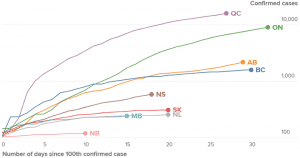Sobering thoughts, regarding distinctions in public health leadership culture
At previous posts, I’ve featured comments about COVID-19 from University of Toronto health epidemiologist Dr. David Fisman.
One such previous post is entitled:
The post refers to a March 13, 2020 CBC interview with Dr. Frisman, an infectious disease physician and professor of epidemiology at the University of Toronto’s Dalla Lana School of Public Health.
In the latter interview, Dr. Fisman notes there are places in the U.S. – “a lot of blind spots” – where testing capacity appears very limited.
“It’s a very big, very heterogeneous country and it lacks effective public health leadership right now,” he notes. “It’s not just a problem for the Americans, it’s a problem for us too because we’ll import those cases.”
In the CBC interview, Dr. Fisman sums up the state of affairs the U.S. is facing:
The last time you were on our program you were particularly concerned about the situation in the U.S. and how they’re dealing with COVID-19. What’s your take on that now?
You know the United States to me actually represents a little bit of a tragedy. You have a country that has, in the CDC, probably the best public health institution on the planet. And you see it hamstrung by a federal executive branch. What that results in is basically a decapitated public health system.
April 6, 2020 CBC article compares responses in British Columbia and Ontario
An additional comment of interest is featured at an April 6, 2020 CBC article entitled “Why B.C. is flattening the COVID-19 curve while numbers in central Canada surge.”

Source: April 17, 2020 Global News article entitled: “Canada is flattening the coronavirus curve. That’s ‘good news,’ expert explains.”
The subheading for the article reads: “Luck and timing is part of the equation — but leadership at the top could also play a role.” An excerpt reads:
“You’ve got a functioning public health system, with integration of lab and epidemiology and service in British Columbia,” [Dr. Fisman] said. “Here in Ontario, we have had difficulties with public health leadership culture for a long time.”
Rhetoric, in place of immediate, organized action, gives rise to lethal consequences
In the larger international scheme of things, despite differences in rates of infections among provinces, Canada appears to be doing relatively well.
The larger picture is discussed most recently at a post entitled:
April 7, 2020 Reuters article reports that British scientists were slow to sound the alarm
With regard to developments in the United Kingdom, an April 7, 2020 Reuters article is entitled: “Special Report: Johnson listened to his scientists about coronavirus – but they were slow to sound the alarm.”
An excerpt from the article, which refers among other things to the role that cognitive bias may have played among public health planners, reads:
The upbeat tone of that briefing stood in sharp contrast with the growing unease of many of the government’s scientific advisers behind the scenes. They were already convinced that Britain was on the brink of a disastrous outbreak, a Reuters investigation has found.
Interviews with more than 20 British scientists, key officials and senior sources in Johnson’s Conservative Party, and a study of minutes of advisory committee meetings and public testimony and documents, show how these scientific advisers concluded early the virus could be devastating.
But the interviews and documents also reveal that for more than two months, the scientists whose advice guided Downing Street did not clearly signal their worsening fears to the public or the government. Until March 12, the risk level, set by the government’s top medical advisers on the recommendation of the scientists, remained at “moderate,” suggesting only the possibility of a wider outbreak.
April 9, 2020 Stat News article refers to U.S. hit-or-miss response
An April 9, 2020 Stat News article is entitled: “‘We’re being put at risk unnecessarily’: Doctors fume at government response to coronavirus pandemic.”
An excerpt reads:
STAT interviewed more than a dozen physicians and scientists around the country, and one after another, they leveled strikingly similar critiques at both the federal and local levels: That the Trump administration neglected scientists and public health experts and downplayed the severity of the disease, helping stoke a spread of misinformation. That many state leaders, toeing party lines, were too paralyzed to act in a timely fashion. And that the Centers for Disease Control and Prevention, once a venerable institution, bungled a critical component of pandemic control — diagnostic testing.

Leave a Reply
Want to join the discussion?Feel free to contribute!